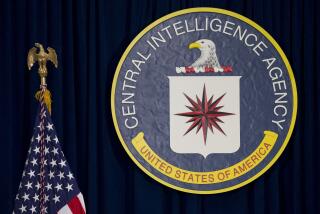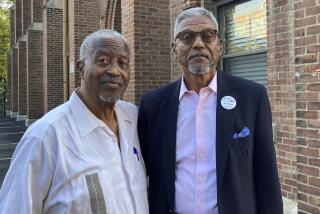U.S. Denies Gulf War Illness Cover-Up Charge
WASHINGTON — The Clinton administration sought Wednesday to fend off new criticism of its handling of Persian Gulf War illness complaints as two former CIA analysts accused the agency of covering up evidence that thousands more soldiers may have been exposed to chemical agents.
Both the Pentagon and Central Intelligence Agency issued statements denying the charges, and the President’s Advisory Committee on Gulf War Veterans’ Illnesses--which is probing the issue--said it already had considered the evidence in question.
The former analysts, Patrick G. and Robin Eddington, said Wednesday that they found evidence of up to 60 separate incidents in which nerve gas and other chemical weapons were released in the vicinity of American troops, but that they were muzzled by CIA higher-ups.
The two, who are husband and wife, resigned from the CIA earlier this year and are writing a book on their allegations. Patrick Eddington said in an interview that he believes the government is engaged in “a pattern of deception and denial” that “is continuing to this day.”
It was not clear what impact the new allegations would have. Sen. Arlen Specter (R-Pa.) and Rep. Christopher Shays (R-Conn.), chairmen of the congressional panels looking into the issue, were unavailable for comment. Those panels both have probed the administration’s handling of Gulf War medical cases.
The thrust of the Eddingtons’ charges, reported initially in the New York Times, is that the CIA is hiding logs and cables that show Iraq had moved chemical weapons near its border just before the Gulf war and that U.S. commanders knew their troops might be at risk.
*
Patrick Eddington, who is 33, also charged that Defense Secretary William J. Perry and Gen. John M. Shalikashvili, chairman of the Joint Chiefs of Staff, lied in a 1994 letter to veterans in which they asserted that no U.S. troops had been exposed to chemical agents.
Actually, the 1994 letter by Perry and Shalikashvili said only that the Pentagon had no information indicating “that chemical or biological weapons were used in the Gulf”--an assertion that the Defense Department insists it still believes is true today.
The Pentagon conceded in June that it had found fresh evidence a few weeks before that some U.S. Army units may have been exposed to toxic agents in March 1991, when they blew up an Iraqi bunker containing chemical rockets.
Pentagon officials have insisted that they did not know about the possibility that U.S. troops had been exposed until last spring. Defense Department officials now say as many as 20,000 troops may be involved.
Both the Pentagon and CIA reacted sharply on Wednesday to the Eddingtons’ allegations. CIA officials said the evidence the Eddingtons cited involved “raw intelligence reports” containing information that later proved untrue or could not be confirmed.
Patrick Eddington apparently has been unhappy with the CIA’s analysis for some time. In December 1994, he wrote a letter to the Washington Times, a conservative newspaper, contending there had been “a consistent pattern of lies and evasions by senior officials.”
“Our forces were exposed to Iraqi chemical and possibly biological warfare agents,” he wrote, not identifying himself as a CIA analyst. He charged officials did not want that known because it would show that U.S. defenses against such weapons had been “seriously wanting.”
More to Read
Get the L.A. Times Politics newsletter
Deeply reported insights into legislation, politics and policy from Sacramento, Washington and beyond. In your inbox three times per week.
You may occasionally receive promotional content from the Los Angeles Times.










